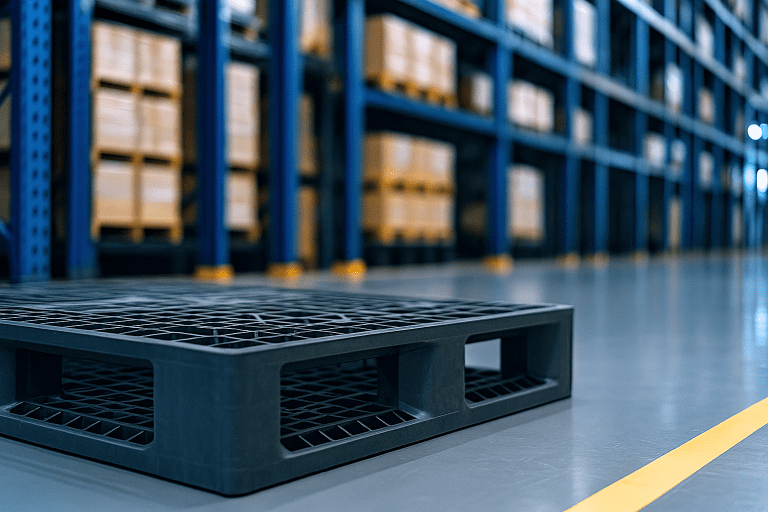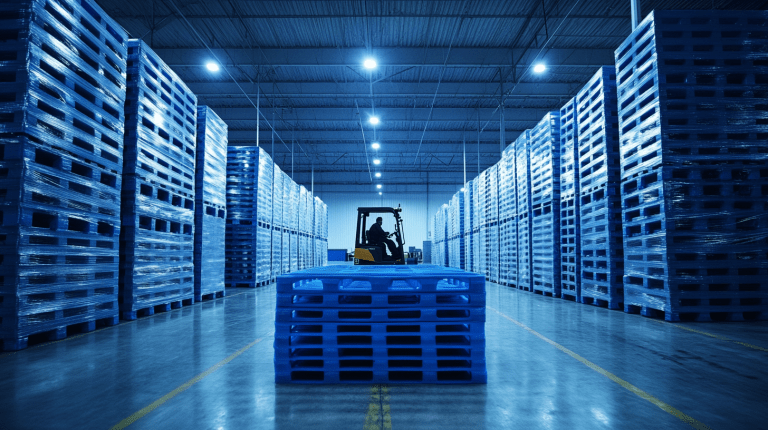Sustainability has become a critical focus in recent years across industries.
In logistics, a sector responsible for significant carbon emissions and resource consumption, the call for sustainable solutions has never been more urgent.
As supply chains expand to meet growing consumer demands, the environmental footprint of transportation, packaging, and storage continues to rise, placing immense pressure on businesses to adopt eco-friendly practices.
Amid these challenges, innovative solutions like recycled plastic pallets are emerging as gamechangers. Recycled plastic pallets, available in various pallet dimensions and types of pallets, have become a key solution for businesses looking to align with environmental, social, and governance (ESG) objectives.
Companies like See Hau Global — through its IntracoPalletTM brand — are at the forefront of innovation, providing high-quality recycled plastic pallets in Malaysia designed to meet diverse industry needs.
What are recycled plastic pallets?
Sustainable plastic pallets are durable, eco-friendly pallets made from post-consumer plastic waste. These pallets, often used as shipping pallets or cargo pallets, repurpose discarded materials into practical tools for global logistics.
Instead of producing new plastic pallets or using traditional wooden pallets, recycled plastic pallets promote sustainable manufacturing, reducing energy consumption and minimising environmental harm.
Available in standard pallet sizes and custom pallet dimensions, recycled pallets are ideal for industries requiring export pallets or heavy-duty plastic pallets.
Here’s a closer look at the benefits of using recycled plastic pallets:
Wooden pallets, while widely used, may contribute to deforestation and waste generation. Creating new plastic pallets, on the other hand, is also energy-intensive, releasing greenhouse gases and exacerbating pollution.
Logistics with recycled materials address these concerns by reducing reliance on virgin materials.
1. Recycled plastic pallets reduce carbon footprint
Using recycled plastic pallets significantly reduces the carbon footprint associated with pallet production. Manufacturing pallets from recycled materials requires less energy compared to creating pallets from virgin plastic or wood, resulting in lower CO2 emissions.
2. Recycled plastic pallets reduce waste
By repurposing post-consumer plastic waste, these pallets prevent millions of tons of plastic from ending up in landfills or polluting oceans. Each recycled pallet diverts valuable materials from waste streams, mitigating pollution and promoting a culture of reuse, aligning with broader zero-waste goals.
3. Recycled plastic pallets promote energy efficiency
Recycling processes typically consume less energy by bypassing the extraction, refining, and manufacturing steps associated with new materials. Compared to wooden pallets, the energy savings are even more pronounced, as recycled plastic pallets eliminate the need for logging, sawing, and kiln-drying wood.
These energy reductions translate into a smaller overall environmental footprint, making recycled plastic pallets a sustainable choice for eco-conscious businesses.
4. Recycled plastic pallets are durable
Sustainable plastic pallets boast a lifespan far longer than traditional wooden pallets. Their durability means they can endure repeated use in demanding environments, such as cargo shipping and heavy-duty applications, without succumbing to wear and tear.
Unlike wooden pallets, which are prone to splintering, warping, or rotting, recycled plastic pallets maintain their structural integrity over time. This extended lifespan reduces the need for frequent replacements, conserving resources and lowering operational costs.
How recycled plastic pallets contribute to a circular economy:
The concept of a circular economy emphasizes keeping materials in use for as long as possible.
In a traditional linear economy, resources are often used once and discarded, creating unnecessary waste and pollution. However, incorporating recycled plastic pallets into supply chains promotes a circular model, where products and materials are continuously reused, refurbished, and recycled to minimise environmental impact.
Recycled plastic pallets are designed with durability in mind, allowing them to be reused multiple times over an extended period. After their initial use, sustainable plastic pallets can be recycled further, breaking the cycle of waste and ensuring that the material is not disposed of in landfills or oceans. During recycling, See Hau Global blend the old recycles with fresh recycles to ensure quality consistency and creating the possibility of indefinite recycling of used plastic pallets.
Instead of creating a burden, these pallets are reintegrated into the production system, where they are transformed into recycled pallets or other products. This process supports a
closed-loop system where plastic waste is repurposed and kept in use, reducing the reliance on single-use plastic products.
Helping businesses break the cycle of waste
For businesses looking to adopt a circular economy, logistics with recycled materials are instrumental in creating a sustainable supply chain. Industries such as cargo shipping, manufacturing, and retail are already seeing the benefits of this sustainable approach.
Recycled plastic pallets offer a practical solution that aligns with corporate sustainability goals while reducing costs associated with raw material acquisition and waste management.
From export pallets used in global trade to cargo pallets moving goods across local supply chains, recycled plastic pallets are rapidly becoming the preferred option for businesses committed to environmental responsibility. Not only do they support sustainability initiatives, but they also help companies comply with increasing environmental regulations, enhance their reputation, and appeal to eco-conscious consumers.
Looking to incorporate recycled plastic pallets and achieve sustainability goals in logistics operations? Connect with us for a fully customised solution today.





